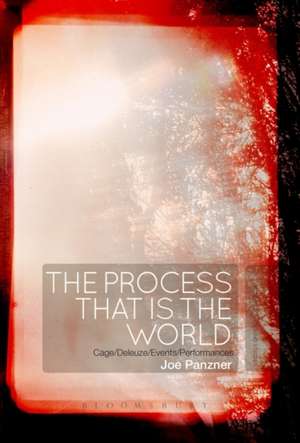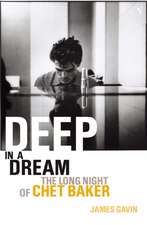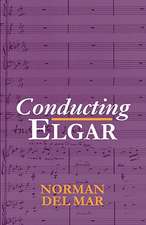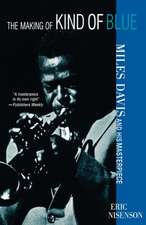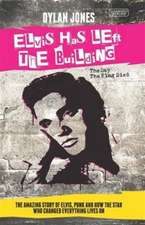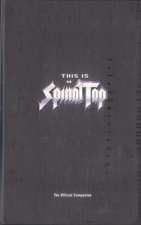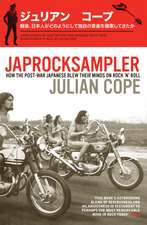The Process That Is the World: Cage/Deleuze/Events/Performances
Autor Lecturer in Musicology Joe Panzneren Limba Engleză Paperback – 31 mai 2017
| Toate formatele și edițiile | Preț | Express |
|---|---|---|
| Paperback (1) | 256.95 lei 6-8 săpt. | |
| Bloomsbury Publishing – 31 mai 2017 | 256.95 lei 6-8 săpt. | |
| Hardback (1) | 656.47 lei 6-8 săpt. | |
| Bloomsbury Publishing – 16 dec 2015 | 656.47 lei 6-8 săpt. |
Preț: 256.95 lei
Preț vechi: 295.11 lei
-13% Nou
Puncte Express: 385
Preț estimativ în valută:
49.17€ • 52.58$ • 40.99£
49.17€ • 52.58$ • 40.99£
Carte tipărită la comandă
Livrare economică 18 aprilie-02 mai
Preluare comenzi: 021 569.72.76
Specificații
ISBN-13: 9781501334283
ISBN-10: 150133428X
Pagini: 240
Dimensiuni: 234 x 158 x 18 mm
Greutate: 0.34 kg
Ediția:NIPPOD
Editura: Bloomsbury Publishing
Colecția Bloomsbury Academic
Locul publicării:New York, United States
ISBN-10: 150133428X
Pagini: 240
Dimensiuni: 234 x 158 x 18 mm
Greutate: 0.34 kg
Ediția:NIPPOD
Editura: Bloomsbury Publishing
Colecția Bloomsbury Academic
Locul publicării:New York, United States
Caracteristici
Provides a new portrait of John Cage that will be pivotal among the growing body of work on Deleuze and music
Notă biografică
Joe Panzner is a lecturer in Music History at the Ohio State University and Capital University, USA.
Cuprins
Acknowledgements Chapter One: "The Process That Is The World" (Introduction) Chapter Two: "It Is Not, It Becomes" (Works) Chapter Three: "A Mistake Is Beside the Point" (Ethics) Chapter Four: "Happy New Ears!" (Encounters) Chapter Five: "Through Many a Perilous Situation" (Performances) Chapter Six: "To Inhabit the World" (Politics) Bibliography Index
Recenzii
This smart, well-written book reveals deep and convincing connections (ontological, ethical, aesthetic, and political) between one of the twentieth century's most important philosophers and one of its most important composers - resonances that have been noted by others but never fully explored. Panzner helpfully explicates Deleuze's key ideas and draws on them to develop Cage's philosophical position. Conversely, he shows how Cage exemplifies and expands Deleuze's aesthetics.
This book is a dazzling achievement; Joe Panzner shows how Cage's ideas are in dialogue with continental philosophy and, in so doing, offers important new perspectives on his work, its performance, and its overall significance.
As the prestige and productive power of Deleuze has transformed the Humanities, it is fascinating to see retrospectively Cage's in-tuned-ness to the philosophical cutting edge that most of the English speaking world pretty much missed at the time. The Process that is the World brings the perplexing artistic character of John Cage into a philosophically "respectable" conversation with one of the most important Western philosophers since Aristotle in ways that strikingly illuminate their shared creative territory. Panzner's skillful and compelling parsing of the richly resonant strands of thought that characterize both Cage and Deleuze adds significant depth to our understanding of both of them, and this expertly written work goes far in reminding us how significant John Cage really is. Panzner reminds us that the experiments and productions of musicians have always had an excess philosophical value, something not even philosophy can supply itself with. A brilliant calibration of these two highly esoteric thinkers that has the potential to open up new territories of correspondence between music and philosophy, The Process that is the World will surely mark one of the early and most significant moments in music's conceptual turn towards Deleuze, and will instantly become an important touchstone in both Cage and Deleuze studies.
This book creates an utterly convincing link between experimental music and radical philosophy; or more broadly, between the boundaries of thought and the limits of artistic practice. The parallels between Cage and Deleuze that Panzner finds are uncanny: they will have you reading one through the eyes and ears of the other until you hear their work as the kind of collective assemblage both men loved.
This book is a dazzling achievement; Joe Panzner shows how Cage's ideas are in dialogue with continental philosophy and, in so doing, offers important new perspectives on his work, its performance, and its overall significance.
As the prestige and productive power of Deleuze has transformed the Humanities, it is fascinating to see retrospectively Cage's in-tuned-ness to the philosophical cutting edge that most of the English speaking world pretty much missed at the time. The Process that is the World brings the perplexing artistic character of John Cage into a philosophically "respectable" conversation with one of the most important Western philosophers since Aristotle in ways that strikingly illuminate their shared creative territory. Panzner's skillful and compelling parsing of the richly resonant strands of thought that characterize both Cage and Deleuze adds significant depth to our understanding of both of them, and this expertly written work goes far in reminding us how significant John Cage really is. Panzner reminds us that the experiments and productions of musicians have always had an excess philosophical value, something not even philosophy can supply itself with. A brilliant calibration of these two highly esoteric thinkers that has the potential to open up new territories of correspondence between music and philosophy, The Process that is the World will surely mark one of the early and most significant moments in music's conceptual turn towards Deleuze, and will instantly become an important touchstone in both Cage and Deleuze studies.
This book creates an utterly convincing link between experimental music and radical philosophy; or more broadly, between the boundaries of thought and the limits of artistic practice. The parallels between Cage and Deleuze that Panzner finds are uncanny: they will have you reading one through the eyes and ears of the other until you hear their work as the kind of collective assemblage both men loved.
